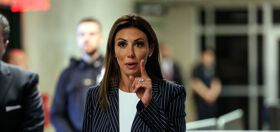
Kenneth Howell, a nine-year University of Illinois adjunct professor, was just trying to inform his Catholicism course students about the right and wrong way to answer questions about homosexuality on his final exam. He lost his job over it.
In May he sent an email explaining how to use the moral theory of utilitarianism (which he describes as “somewhat akin to a cost/benefit analysis”) to decide whether supporting same-sex marriage is right or wrong.
I think it’s fair to say that many, maybe most Americans employ some type of utilitarianism in their moral decision making. But there are at least two problems. One is that to judge the best outcome can be very subjective. What may be judged good for the pregnant woman may not be good for the baby. What may be judged good for the about-to-cheat-husband may not good for his wife or his children. This problem of subjectivity is inherent in utilitarianism for a second reason. Utilitarianism counsels that moral decisions should NOT be based on the inherent meaning of acts. Acts are only good or bad relative to outcomes. The natural law theory that I expounded in class assumes that human acts have an inherent meaning (remember my fist vs. extended hand of friendship example).
One of the most common applications of utilitarianism to sexual morality is the criterion of mutual consent. It is said that any sexual act is okay if the two or more people involved agree. Now no one can (or should) deny that for a sexual act to be moral there must be consent. Certainly, this is one reason why rape is morally wrong. But the question is whether this is enough.
Well answer the question, professor! And please don’t forget to express your limited knowledge of anal sex.
One example applicable to homosexual acts illustrates the problem. To the best of my knowledge, in a sexual relationship between two men, one of them tends to act as the “woman” while the other acts as the “man.” In this scenario, homosexual men have been known to engage in certain types of actions for which their bodies are not fitted. I don’t want to be too graphic so I won’t go into details but a physician has told me that these acts are deleterious to the health of one or possibly both of the men. Yet, if the morality of the act is judged only by mutual consent, then there are clearly homosexual acts which are injurious to their health but which are consented to. Why are they injurious? Because they violate the meaning, structure, and (sometimes) health of the human body.
Well, a student (on behalf of a friend in the class who wanted to remain anonymous) complained to the head of the university’s religion department, and said that while Howell thinks he was just teaching about what the Catholic Church has to say about homosexual acts, he was really overstepping: “Teaching a student about the tenets of a religion is one thing,” read the email. “Declaring that homosexual acts violate the natural laws of man is another. The courses at this institution should be geared to contribute to the public discourse and promote independent thought; not limit one’s worldview and ostracize people of a certain sexual orientation.”
How about we take this to the next level?
Our newsletter is like a refreshing cocktail (or mocktail) of LGBTQ+ entertainment and pop culture, served up with a side of eye-candy.

Howell’s response? The church’s teachings are based on “natural moral law,” and that trumps everything: “My responsibility on teaching a class on Catholicism is to teach what the Catholic Church teaches,” he says. “”I have always made it very, very clear to my students they are never required to believe what I’m teaching and they’ll never be judged on that. … I tell my students I am a practicing Catholic, so I believe the things I’m teaching. It’s not a violation of academic freedom to advocate a position, if one does it as an appeal on rational grounds and it’s pertinent to the subject.”
Suffice to say, Howell’s contract was not renewed. He’s since taken up house with the Alliance Defense Fund, which regularly comes to the rescue of practicing Catholics railing against homosexuality.
But should a self-identified Catholic who teaches Catholic theory at a university be punished for, uh, teaching students exactly what the Catholic Church believes? From his email to students, it sounds like Howell produced a script on what is right and wrong, from his personal viewpoint, regarding gay sex acts. Should we consider that to be just a coincidence, since he is also a practicing Catholic? Would the situation be any different if he prefaced his email to students with a caps-lock, bold-font explanation that “THIS IS JUST WHAT THE CATHOLIC CHURCH TEACHES, AND I’M NOT TRYING TO SHOVE IT DOWN YOUR THROAT.” If students in the class are required to answer questions on the final exam from the perspective of the Catholic Church, and not their own set of beliefs, then his email was really a cheat sheet in how to answer any questions about gay sex.
Professors, like anybody else, walk into the classroom with their own preconceived notions about the material they are teaching. Which is perfectly acceptable. It’s a touchier subject when the professor is teaching a course on religious beliefs, which inevitably delves into morality. But Howell shouldn’t be punished for believing certain things about gays, nor should he be punished for explicitly communicating to students what the Catholic Church believes about them, either. What he shouldn’t do is tell students there is only one proper way to view these subjects. I’ve re-read his email a number of times, and it could be argued he was just relaying Catholic theory (as is appropriate to do given his job); it could also be argued that he was proselytizing to students.
But being a devout Catholic does not preclude Howell from objectively teaching Catholic theory, the same way being Jewish or Mormon or gay or atheist would not. And then there’s this paragraph from Howell’s email, which suggests he blurred the line between teaching about the Catholic Church and teaching about his own standpoint on morality:
Before looking at the issue of criteria, however, we have to remind ourselves of the ever-present tendency in all of us to judge morality by emotion. The most frequent reason I hear people supporting same-sex marriage is that they know some gay couples or individuals. Empathy is a noble human quality but right or wrong does not depend on who is doing the action or on how I feel about those people, just as judging an action wrong should not depend on disliking someone. This might seem obvious to a right thinking person but I have encountered many well-educated people who do not (or cannot?) make the distinction between persons and acts when engaging moral reasoning.
And there’s this line: “Unless you have done extensive research into homosexuality and are cognizant of the history of moral thought, you are not ready to make judgments about moral truth in this matter. All I encourage is to make informed decisions.” That is: You cannot believe yourself to make the proper conclusion about gay people and their sex lives unless you study the field extensively; until then, we should trust what the Catholic Church believes. That’s where Howell lands in trouble.
[News Gazette, AP]



















Kate
This guy is clearly an asshat but why would one attend a religious institution and expect them to teach you sane views on homosexuality? It’s like expecting a cat to lay an egg.
Jeff Atwood
Why does this “professor” make no mention of heterosexual sodomy? Is there one sexually active heterosexual who hasn’t performed these acts? It’s easy to condemn the behavior of a minority, but when the majority exhibits the same practice, these moral crusaders are silent. This leads one to believe that the arguments are specious and meant entirely to demonize the minority. The heterosexual majority would reject this guy quickly if he were to criticize their performing the same, non-procreative acts. Let him, and the Catholic church take on heterosexual, non-procreative sex: even the Pope is silent on this issue now, lest he alienate more of this followers.
Drake
@Kate:
This occurred at the University of Illinois, which is a public institution, NOT a religious institution.
reason
It’s a subjective topic and really depends on whether he was teaching about catholic doctrine or morality in a broader context. If the former he is merely articulating the reasoning of the church, if that is how they perceive it. If the latter he is expressing his view point, and should not mark as incorrect an answer that summarizes a different conclusion granted that it is supported by strong reasoning. He should not be fired based on this alone, as long as his actions as a instructor are not based on prejudice. Although, a more difficult point that needs to be examined is his comments impact on students in the class, and if it adversely affects their ability to perform. Overall I believe he showed poor judgment by discussing a topic of such contention while interjection his opinion, which carries more weight in the classroom, into the conversation. We discussed abortion and religion in a college level biology class, but the instructor laid the ground rules and refrained from providing an opinion.
Granted the professor was relived, I take it there were more issues at hand with this particular individual.
Lanjier
The wonderful Alliance Defense Fund. They are really putting together a gold-plated list of losers. I wonder how their George Rekers lawsuit is coming along.
IlliniFan
I wish he would have used FIRE or something, in any case- I think it’s ok to teach Catholic teaching on homosexuality in a class on Catholicism
B
No. 4 · reason wrote, “Granted the professor was relived, I take it there were more issues at hand with this particular individual.”
… a distinct possibility. When QUEERTY wrote “He lost his job over it,” and given the lack of any supporting evidence, it looks like a classic example of the “post hoc ergo propter hoc” logical fallacy – just because one event follows another does not mean they are causally related.
gilber
another example of what i have said here before.philosophers and theologians FABRICATING and implanting their twisted ideologies.”natural laws” is a philosophical expressions,they invented it and they manipulate its meaning,the first to do this was Plato,they created the social version in order to hinder the actual understanding of the mechanism taking place in the physical and mental planes.Cooking is unnatural,cutting one’s own nails is unnatural,they are many things that just simply can’t be allow to grow on one’s body or experienced. nature has PHYSICAL LAWS not philosophical ones.you can be made to inseminate one thousand females with different degrees of structural dimorphism but you must understand that sexual deviancy is directly proportional to the multiplicity of structural variations that you are absorbing and this will target the mind one way or the other.heterosexuality doesn’t exit physically because it is not something that can be “absorbed”.when i say that it doesn’t have a physical existence i mean it is neither a product nor an emission.the etiology of heterosexuality is heterophilia.when thinking about sexuality we must understand that they are two completely different body emissions sodomy and lesbianism.a male that emits sodomy but absorbs lesbianism are heterophilic,non heterophilic minds,homophilic are considered according to the language of mathematics monosexuals,because the sexual multiplicity is equal to one.i have mentioned the jargon used by the social version,with the purpose of creating the illusions that it describes the actual physical truth,he mentioned that some males have to be the woman,this is the typical manipulation of the ideological version and its illusory roles,i’m sure that when he is doing oral sex to his wife he doesn’t think he is doing LESBIANISM and that he is not masculinizing(sodomizing) her.physicists are not interested in behavior but in the psycho physical consequences of mechanisms.in general,under any condition and transformation,sexual dimorphism is directly proportional to sexual inversion/deviancy.once we understand the mechanism of sexuality transmission,we can certainly argue that “heterosexuals” reproduce by using lesbianism and sodomy,and that homosexuals reject the idea of making babies by “using” lesbianism and sodomy.
Steve
“The most frequent reason I hear people supporting same-sex marriage is that they know some gay couples or individuals. Empathy is a noble human quality but right or wrong does not depend on who is doing the action or on how I feel about those people, just as judging an action wrong should not depend on disliking someone. ”
Yes but Kenneth… you’re missing the point. Knowing gay couples doesn’t simply provide empathy – gay couples generally serve as a reminder to their friends that everything you’re saying about them is completely bogus. That’s the issue. They know gay couples, and so they know what you’re saying doesn’t make a lick of sense. It has nothing to do with empathy – they can just see with their own eyes just fine.
todd
‘One example applicable to homosexual acts illustrates the problem. To the best of my knowledge, in a sexual relationship between two men, one of them tends to act as the “woman” while the other acts as the “man.”‘
Really? Do women have prostates which gives them pleasure?
Jeff K.
Skewer him. Maybe from now on bitches will think twice…
peteNsfo
The guy’s an idiot…
You need a moral issue; leadership of clergy enabled to commit violence against children and women while hierarchy remain profiteers at the expense of poorest people of the world. Discuss.
Leave the gays out of it. I think he really thought he had something clever on his hands and only exposed his own ignorance and arrogance.
alan brickman
Free speech is still free?…..Right??
james
@Kate:
fuck you
you’re an idiot
it is NOT a religious institution, learn to read you dumbshit
and the guy is clearly NOT an asshat for teaching a course in something that he is an expert in: catholicism
dumbass
james
@gilber:
what a moron
Sceth
A Catholic friend of mine majoring in Religious Studies calls his classes the fastest path to atheism. That might be a clue about how religion is taught by, ahem, legit academics.
@alan brickman: What you say in your capacity as an employee is not free speech; you have a role as a professor to speak only about relevant things in a professional way, say, on class e-mail lists.
@gilber: “[You] can be made to inseminate one thousand females with different degrees of structural dimorphism,” and everything after that, is confusing. I only read your whole post because you used the word “mathematics” somewhere [LOL], and when I was done, I was amused and still confused.
@Kate: Catholic schools in particular have a nice and long history of academic freedom. Of course there are transgressions, but they’re largely eager debaters.
jeffree
Mistah Professor overstepped his own field of expertise theology. “Utilitarianism” has no place in Catholic theology. His telling his students about what “a doctor said” about MSM activities is simply wrong.
I’m not Catholic, nor Christian, but a course on Catholicism should stick to that church’s teachings.
Catholics call us “intrinsically disorded” —how horrible is that?– and kick gay men & wymyn out of the seminary/nunnery but that’s got NADA to do with utilitarianism. It’s based on Old Testament & New Testament passages that have been woefully mis-read & badly interpreted. Or so I have read in Boswell.
His failing was in forgetting what he was there to teach — and at a state-funded school, that’s way out of bounds. Maybe at Loyola or Notre Dame that would pass muster, but not at U of I.
ewe
@james: You and yours do not get to twist and distort catholicism. You are the one acting like an idiot cause it is plain to see you think it is perfectly alright to discriminate against homosexual people because you just think it is ok to do that. Don’t think you will not be addressed when you come onto a gay site and take your ugly dump. Bitch!
jeffree
@ Ewe: Nicely said, as always!
Where have u been ? I miss seeing you ’round here.
Don’t be a stranger, ok?
Please keep posting….
Michael
He should have gotten fired for giving out the answers to the test. (Aside, I could have used this help in Algebra.) What’s really bad, is that in order to pass this test, you had to accept his answers.
Shaun Azzopardi
Kissing ‘violates the meaning, structure, and (sometimes) health of the human body’ too. You don’t see Christians denouncing it as sin and unnatural.
Double standard?
Robert
I wonder why he doesn’t mention that straight people practice anal sex, both single and married and some are catholics. Why doesn’t he address that. But no, the roman cult would never condemn that because they’re straight. This man is beyond ignorant.
Tallskin
Man’s a fuckwit. On those grounds alone he isn’t fit to teach philosophy, he cannot construct a logical argument.
I mean he’s arguing about utilitarianism, fine and logical, then he goes off onto a tangent talking about anal sex and natural law!
wanker
Joe
This idiot professor’s major mistake was not in bringing up the subject (either of the Church’s position or of utilitarianism) but of ignoring the work of other academic disciplines on this topic. He claims he is just showing his student’s what the Church teaches. He is being dishonest. Any theologian or philosopher worth their degree knows that even in sexual morality within Catholicism, there IS disagreement on this issue. He could have stated “The institutional Church teaches this, but various theologians have held otherwise..” I teach the same subject at a Catholic university, and by having students look at the wide range of theological thought on this issue leads them to see how illogical and silly the institutional Church’s stand is. And then to bring in “and a doctor told me…” UG! Sloppy, lazy academic work that completely ignores medical evidence. He should be repremanded for that alone. And one more thing… lol… I do, however, disagree with Queerty’s line “Professors, like anybody else, walk into the classroom with their own preconceived notions about the material they are teaching.” This makes it seem as if the student’s ideas are “just as good” as the professors. While that sounds good to our very egalitarian ears, it simply is not the case. One must study for many years in a particular subject to be good at it. A first year student simply is not… although in the case of THIS professor, I might be wrong 🙂
Andreusz
I don’t understand why anyone affiliated with Catholic Church is treated with any seriousness when they discuss morality.
Jeff
@alan brickman:
No one is saying that he can’t say this. That’s free speech. However, the university is within its rights to dump him. Speech may be free, but it has consequences. Ask Mel Gibson.
Patrick
Not all ways of presenting “official Catholic teaching” are equal. One can present it so badly that it might warrant firing. And I think this might be one of those cases. The original e-mail is illuminating. Here are (some of!) the points at which he goes beyond simply “presenting what the Church teaches”:
1. Why did he have to bring up the topic of homosexuality in a discussion of utilitarianism? He basically went out of his way to talk about a contentious topic.
2. The implicit comparisons with bestiality and pedophilia are troubling and insulting. One can teach “the Catholic position” without making such comparisons.
3. His speculative discourse on anal sex is humorously unnecessary.
4. The way he characterizes the proponents of same sex relationships as emotional and potentially irrational stifles debate and different viewpoints.
5. This is a technical point but I think it’s important: He relies on a controversial understanding of the natural moral law (“the New Natural Law” school of thinking) that many Catholics disagree with. He thinks that Catholic teaching is objectively binding on all rational creatures and that if you disagree with it you are somehow not being rational. Mainstream Catholic theologians (and probably figures such as Thomas Aquinas himself) understand that people of good will and good faith can disagree about what the natural law is and what it means to live a Christian life. So maybe it was as simple as his boss not wanting someone who teaches this kind of view of the natural law.
In sum, this story is far more complicated than someone getting fired for “just presenting what the Catholic Church teaches.”
ellipse
I’s worth noting that he was also let go by the Newman Catholic Center at the U of I.
He has a narrow line to walk teaching (not preaching) Catholic doctrine at a public school, but it is true that the UI is full of instructors that know better how to not cross that line. He tried to argue that only wizened old scholars (of course he thought he was one) could form a valid opinion on such subjects, and he used too liberally used the Catholic churches disingenuous language of “natural law” to blur the distinction between objective truth and theology.
The University can find a teacher who knows the difference. In the meantime, he is playing the martyr for the right wing.
Ogre Magi
Basically, the Catholic church is the enemy of LGBT community. Anyone who can’t see that is a fool.
nikko
Religious straight people. Ugh. Lions, get them…..
TTTTom
The course is about what the Catholic Church teaches. It all sounds correct to me. If you don’t want to know what the Catholic Church teaches, don’t take this course.
the crustybastard
Well, how would YOU attempt to make the Catholic Church’s Medieval values relevant to an evolving, modern and (at least aspirationally) egalitarian society?
Of course they have to pretend some “natural law” (that only they understand) magically trumps actual laws and common sense.
The pope also pretends to be a king by adopting all kinds of emblems of royalty (a coat of arms, tiaras, red shoes, a throne, the globus cruciger, a palace guard in medieval costume, etc.)
But just because the pope is really good at dress-up doesn’t make him a real king.
Why anybody thinks that any priest has any intellectual credibility is a constant source of puzzlement to me. They’re on par with astrologers and crystal-healing nitwits.
Amaturus
It sounds to me like he’s just conflates anecdotes from a physician friend (likely from his church) with proper proof. He should have been called out in class and it would have made for an interesting discussion. I’ve always felt like my classmates were too timid about challenging professors, and that seems like the case here. Having a friend report him to the administration seems rather backhanded. I don’t think he should have lost his job, but the tone of his emails don’t really invite students to try and contradict him, which is what my best humanities professors have done. Hopefully they’ll find a better replacement, but they might just stop offering the course altogether, which benefits no one.
axos
There’s a lot to say about this man and his email – because it’s not exactly crystal clear.
The last subject matter first: “You can’t judge homosexuality on moral grounds before you have studied it extensively.” What does that mean? How do you “study” homosexuality extensively? And why won’t basic rules on ethic issues be enough, without those extensive studies? His thoughts here are very blurred and he ends up in a strange void.
The anal sex part: I have no problem with his basic statement, that the human body is not really built for it – which is why quite a lot of people (straight and gay) can’t practice anal sex, even if they want to. It’s his conclusion that’s wrong. The right answer to the statement that the human body isn’t built for anal sex, is: So what? Life is a little more complicated than the professor wants to acknowledge, it’s full of contradictions.
To take a very simple example: A large part of people in the world can’t drink milk. Are they unnatural and immoral? Or are the others unnatural, those who do drink milk and tolerate it?
axos
Btw, the Catholic Church is not teaching anything that’s natural. What’s natural is to have sex when you want to (with someone who wants to), but the Church puts all sorts of hurdles in the way, telling you not to not ever trust your instincts.
Robert
Axos, No. 33….anal sex is by no means difficult. It depends on the two consenting people and for many on the receiving end, is a very enjoyable experience if that person happens to be a male. Its ideally enjoyable for the male performing the act on another. Saying that the human body isn’t built for it is arguable since you would then have to say that no other orifice is built for it other than a vagina. The roman cult, among others, considers anything other than vaginal intercourse, immoral and unnatural. Far more straights engage in sodomy, both anal and oral, some of whom are catholics. A lot of staight men want to do it but a lot of women won’t allow it. Its not unnatural to have anal sex if both parties are consenting. The Roman cult least of all has absolutely NO moral authority to judge and condemn others for any sexual practice considering its appalling history of sexual abuse which is millenia old and that will continue. It will never be eradicated entirely unles the cult itself shuts down, something I would welcome. What is unnatural is its insistence that sexual relations must and always should be confined to heterosexual marriage. What gives them the authority to make such an absurd claim anyway? Not every married couple can procreate nor should the be compelled to if they choose not to. A celibate clergy giving advice on something about which most of them have no experience makes their arguments that much more irrelevant.
axos
Robert, Robert, you are kicking in an open door! Please don’t react instinctively. I said the human body is not built for anal sex (or oral, for that matter), but I did NOT say it’s unnatural to do those acts and of course both straights and gays do it for pleasure, and that’s just as fine as anything else. What I meant is life is more complicated than just staring at how we are originally built. Nature is much more complicated. A penis and a vagina are “made” for each other, but that doesn’t mean it’s the way you have to do it. Both penis and vagina can be perfectly happy and functioning with something else, and if you are gay, ONLY with something else, and that is also “natural”. 🙂
The only problem with anal sex is that it actually hurts for a lot of people, or for some people (I don’t know the percentage). But that’s a practical problem, not a moral one.
axos
I’m highly amused! My latest comment is awaiting moderation, and I suspect it’s because I used the anatomically correct words for male and female genitalia. OK, Robert, all I wanted to say is that you misunderstood me – I’m with you.
Robert
Axos, I figured you were with me, just wanted to point out the erroneous statements the roman cult and its representatives make about anal sex and other so called “unnatural” practices it pretends to abhor, having looked the other way for almost 2 millenia while girls, boys and women have been sexually abused up until the present day. The entire hierarchy should be arrested for crimes against humanity for allowing it to continue, starting with the arch culprit Papa Ratzi!
Syl
@ Sceth: Right, but since his employment involved him teaching what the Catholic Church requires its members to believe-including that us queers are “gravely disordered” and should accept a life of celibate misery (but not in the priesthood!) so we can get to heaven and thank God for being such a petty dick-that’s different than if he were a professor of anthropology or calculus and randomly launched into some tirade against the gays.
I’m not saying that the Church’s teachings on gays aren’t outdated, wrong, and barbaric, or that the Church isn’t a giant fucking hypocrite when it says that consensual, loving relationships between two adults are invalid if the two adults have the same genitals, while the abuse of underage children by people in positions of power is covered up and ignored, and thus given tacit approval. Still, saying that this guy should be fired sets a troubling precedent. I say just let him keep shoveling his Vatican-approved BS; people are realizing that half of what the Church teaches is the immutable Word of God is really just the word of Dante. The Church has been lagging behind culture and science for centuries: geocentrism, evolution, and they only canonized Joan of Ark was only canonized in 1920! If they don’t want to lose all relevance, they need to get with the 21st century.
Lymis
The biggest question that is not being addressed is what was the purpose and syllabus of the course?
“Catholicism” is a pretty darn broad topic. It is hard to imagine that the course description and the direction to the professors was “teach whatever you want about Catholicism.”
Was this a history course? A social studies course? A philosophy course? A comparative religion course?
A teacher who was hired to teach “American literature” and only covered the letters to Penthouse, or a teacher hired to teach Roman Civilization but taught the antics of Caligula and Messalina in explicit detail wouldn’t get a pass.
What was he hired to teach, and were did this fit in?
Further, he crossed an important line when he moved from “This is what the Catechism and Papal Decrees say about homosexuality” into the broader context. His comments make it clear that he wasn’t just saying what the Church teaches, but that they were in fact accurate and applicable to everyone else.
If he was teaching that all Jews, Muslims, or other non-Christians were going to hell, he’d be similarly overreaching.
Firing him seems extreme, unless this was not the first case of this – something that will pretty much be overlooked in the media if true. “Jerk oversteps yet again after repeated polite warnings” just doesn’t have the same news value as “Catholic fired for teaching Catholicism.”
I don’t think the Church has a canonical position on gay anal sex, for example. The problem the Church has with it is that it cannot produce children, not that someone is “being the man” and someone else is “being the woman.”
FlopsyMopsyCT
I get so sick of that kind of rhetoric. Maybe someone who has more experience with the Catholic faith than myself can correct me if I am wrong, but in my 20 years of education in Catholic institutions, and the many times I’ve spent in mass and other Church functions and events, I have NEVER once been taught or heard that homosexuality was wrong. I realize this may sound unrealistic, but it is true. Indeed, the topic never once came up in my religion classes, CCD instruction, not even during mass during however many millions of times I’ve attended. Honestly, I came out while I was in Catholic high school and any issues I had with it had nothing to do with conflicts with my faith. Actually, at that point in my Catholic schooling I still had no idea the Catholic Church thought differently about homosexuality. Indeed, most of the students and teachers in my high school were pretty cool about it. My fellow students actually liked me more after I came out.
When it comes down to it, the condemnation of homosexuality that so-called Catholics (I am a Catholic and proud of it) argue endlessly as being some integral Church teaching is based on nothing more than a few random, ambiguous biblical statements. Further, these statements are mostly found in the text of the Old Testament which has little relevance to the post-Vatican II Catholic mass (having been reduced to one reading during the liturgy). To say that the Church’s stance against homosexuality is worthy of the attention it is getting from the Church is, in my mind, completely ridiculous. General Catholic instruction from the Church doesn’t include it.
If I were in the professor’s position, and I received a question regarding the Church’s stance on homosexuality, I would tell the student that the Church’s teaching on homosexuality is incredibly minor compared to other, much more integral parts. To spend class time on a topic that has so little mention in the Scriptures, and is given no mention during the mass (the primary vehicle in teaching lay-Catholics) is just a waste of time.
Maybe my experience is vastly different from some other people on this board or elsewhere, but I really don’t know where the Catholics get this idea that anti-homosexual rhetoric is part of good Catholic teaching.
Robert in NYC
FlopsyMopsyCT….you said…”I would tell the student that the Church’s teaching on homosexuality is incredibly minor compared to other, much more integral parts. To spend class time on a topic that has so little mention in the Scriptures, and is given no mention during the mass (the primary vehicle in teaching lay-Catholics) is just a waste of time.”
The church’s teaching on this is incredibly minor? Really? How do you explain its very vocal and virulent opposition to same-sex civil marriage, among other things? Since when does the roman cult own civil marriage? Its teaching is very clear on that and it certainly isn’t minor. It goes so far as to pour millions of dollars to defeat legislation or state supreme court decisions legalizing it. A form of hate-mongering, hardly minor which proves it supports discrimination against gay people and in some cases those of us who have children who are in turn discriminated against by its opposition to our equality. I think you are in denial. You have a former Hitler youth in Rome who singularly devises a criterion to weed out perceived or potential gay candidates from entering the priesthood yet has yet to devise a criterion to weed out the heterosexual pedophiles and philanderers, some of whom have produced children. Gays are the convenient scapegoats for what he describes as the instigator of all of the “filth” (his word for pedophilia) that has been deeply entrenched for almost two thousand years. He and his cult are hardly in any position to assume any moral authority to judge and condemn gay people, or anyone else for that matter. I’m proud to have renounced my own catholicism.
Robert in NYC
FlopsyMopsyCT….you said…”I would tell the student that the Church’s teaching on homosexuality is incredibly minor compared to other, much more integral parts. To spend class time on a topic that has so little mention in the Scriptures, and is given no mention during the mass (the primary vehicle in teaching lay-Catholics) is just a waste of time.”
The church’s teaching on this is incredibly minor? Really? How do you explain its very vocal and virulent opposition to same-sex civil marriage, among other things? Since when does the roman cult own civil marriage? Its teaching is very clear on that and it certainly isn’t minor. It goes so far as to pour millions of dollars to defeat legislation or state supreme court decisions legalizing it. A form of hate-mongering, hardly minor which proves it supports discrimination against gay people and in some cases those of us who have children who are in turn discriminated against by its opposition to our equality. I think you are in denial. You have a former Hitler youth in Rome who singularly devises a criterion to weed out perceived or potential gay candidates from entering the priesthood yet has yet to devise a criterion to weed out the heterosexual pedophiles and philanderers, some of whom have fathered children. Gays are the convenient scapegoats for what he describes as the instigator of all of the “filth” (his word for pedophilia) that has been deeply entrenched for almost two thousand years. He and his cult are hardly in any position to assume any moral authority to judge and condemn gay people, or anyone else for that matter. I’m proud to have renounced my own catholicism.
Sam
@Jeff: Actually, the University absolutely is NOT within its rights to fire this man based on his viewpoint. The First Amendment applies to government actors. As a state school, the University of Illinois IS the government. They are specifically forbidden from engaging in this kind of viewpoint discrimination. I’m sure the ACLU would have had a field day with this, if ADL hadn’t stepped in first.
That said, he should be fired for being a crappy teacher. His title says he teaches “Thought,” but his arguments on morality could be eviscerated by anyone who has taken even a basic class on logic. His argument that only “natural” or “real” acts are moral is a classic example of begging the question.
Chitown Kev
@jeffree:
I ctually went to Loyola in Chicago and took the required theology courses and this never came up in any of my classes.
I do agree with you that had I taken a class on Catholic doctine where this came up, it would have been fair game but I can’t see this coming up at any Jesuit type school.
Now Notre Dame, on the other hand…
aaron
@Kate: The University of Illinois is a state school, not a religious school.
Is only a view of homosexuality ok that is indifferent and okays everything? Wow, that is true tolerance of others. Why cannot people have different views about homosexuality? If you are not Catholic – what do you care? If you are, it is a reminder that you are rejecting your church’s tradition.
raymond
@Joe: WHy are you still Catholic if this church’s stance is so illogical? Come on, with your few years of grad school and your few publications – are you smarter than the doctors of the church, two thousand years of teaching tradition? Are you so great or do you just show off in front of your students to be looked upon as the great liberal Catholic – one who understands more than the narrow minded pope. That is abuse of power.
I know enough guys like you. Self-importance is more important than straight thinking (how much formal logic have you studied? more than GEM Anscombe? I doubt it … illogical – give me a break).
Medical evidence – wow … that is what you present in the classroom. How do you keep track of the findings? How do you follow these medical findings? I bet you do not read the medical journals but the watered down versions of some fellow left wing theologians … You are so much better and such a first rate theologian!
sammy
He got rehired. That means that homonazis have lost